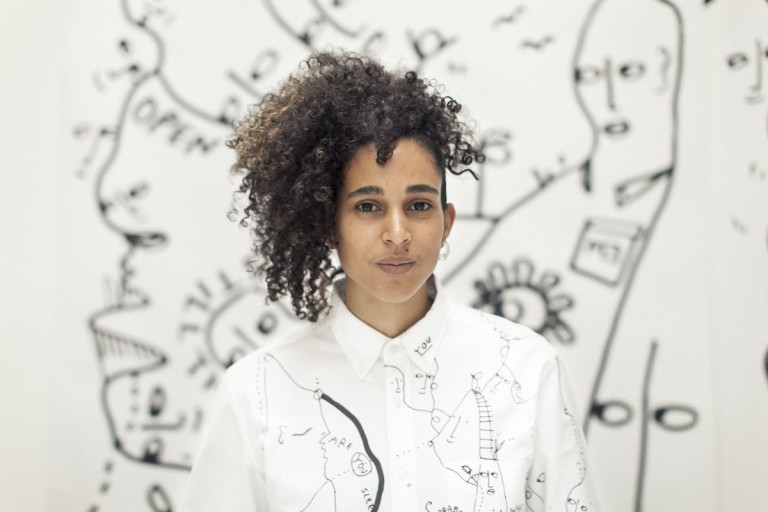In Conversation with Evita Castine: LA-based Photographer & Filmmaker Extraordinaire
Photo by Daniel Lupercio.
Evita Castine, is a LA-based actor, writer, director, photographer making her mark on visual culture with an impressive collection of socially-conscious, captivating projects. Originally hailing from Illinois, and with three degrees under her belt (a recent graduate from the USC School of Cinema M.F.A. film program), Castine has trekked the globe producing, writing and creating riveting stories as seen through her humanistic perspective. Her films carry a broad range of emotional depth, passion, perseverence, and grit. In 'Brick and Lulu' (2014), a young couple navigate the dangerous path between addiction and sobriety, in 'Bart and Cleo' (2015), a photographer reflects on her tempestuous relationship with a punk rock guitarist, and in the documentary 'Exploring Jerry' (2014), a Nigerian artist moves to Beijing to pursue self-exploration. Gallery Gurls talk to Evita Castine about her recent photo exhibit debut titled 'Mes Potos', where she chronicles Afro-Parisians involved in the creative community. Castine also discusses Only Light, her latest film which addresses the harrowing ordeal young woman face in the sex trafficking trade. Only Light will be screened at Indie Night film festival on March 21 at the TCL Chinese Theatre 6 in Hollywood, CA.
Gallery Gurls: The photographs from your new series ‘Mes Potos’ are so beautiful, the subjects seem to exude both a certain power and vulnerability. What triggered the desire to execute this project? Can you describe the casting process?
Evita Castine: Thank you! I normally take a lot of photos of my friends and family because I love to do that and I always have my camera on me while traveling because I love street photography. So when I was visiting Paris last summer to show the film “Only Light” at a festival – I was taking a lot of photographs. It may sound cliché, but I am very interested in people and who they are – so I normally, I meet someone and we start talking and then I will ask them if I can take their photo – it makes me feel like I will keep the moment forever. When I got home and started going through the images, I noticed I had a lot of photos of the people I was spending time with in Paris. I was struck by how they were looking at me at times – people weren’t wearing a “mask” per se, they were just being them. So there wasn’t a traditional casting process – it was very improvisational. I think I gravitate towards certain people and its reflected in the body of work I brought back.
I realized I wanted to show the photographs because I don’t think too many people in the United States are aware of how big the diaspora is or that there are other people of African descent that were effected by the trans-Atlantic slave trade and colonialism. I think there is a certain recognition that happens between people being of African descent no matter where you are in the world. My mother had put me in French class when I was a small child and so when I was growing up – I would try to find people to practice French with me and I always met other Africans who spoke French and they were always very encouraging whether it was about developing my language skills and or exploring my identity. When I was in France, I had the same experience, people wanted to practice their English with me, so I would speak in French and they would answer in English, so I think sometimes the photographs express my admiration for the subjects and we were just having a lot of fun!
"I think there is a certain recognition that happens between people being of African descent no matter where you are in the world."
'Mes Potos', Paris, 2014. Photography by Evita Castine.
On a personal level what did this project reveal to you about the state of the African diaspora in Europe?
Well right before I went to Paris, I spent two months in Beijing, China co-directing a documentary about a Nigerian immigrant who was an artist making his way in China. In Europe and Asia, I saw a lot of people embracing their identity and origins, but still navigating the customs of the country they are living in – it’s like a cultural remix. You can see it expressed in hair, fashion, food and language. In the United States, I think there is a lot of reticence of embracing or wanting to know their origins. I think that’s what was really attractive to me – there is a strong sense of identity that I find missing at times in the U.S. I know this goes into a deeper conversation about the psychological effects of slavery, but being someone who is in search of identity – I definitely want to explore the ways in which people hold onto, fight for, and express their identity in a culture that has attempted to strip it in a means of control through imperialism.
"I think developing your visual imagery and presenting your visual imagery is radical – it’s a sense of agency, it’s controlling your narrative and it’s liberating."
'Mes Potos', Paris, 2014. Photography by Evita Castine.
Your latest film Only Light which is based on human sex trafficking occurring in the US, originated as a project from an Advanced Production class at USC. Tell me about the highs and lows you experienced while making this film and how you ended up with the final result.
One of the highs was getting to make the film and having the University of Southern California School of Cinema pay for us to do it. When I pitched the film with the writer, Thembi Banks and the producer Elena Ostroumova– we told them we wanted to make a film that explored modern day slavery and the commodification of black women’s sexuality in a poetic way. I think back to that and realize how ballsy we were and I laugh – we must have been really convincing because they gave us the money to make the film and people signed up to crew on the project. We were all so passionate about raising awareness of human trafficking that we just went in the room that day waving our flag. We then brought on Zac Skipp another producer – basically working with people that wanted to make the movie too was a big highlight and the fact that we are really great friends now and still working together is great! The lows of making the film were well I should preface and say that making any kind of film can be a challenge – it’s definitely a process – but I think explaining to people the psychology that goes into enslaving someone because I didn’t want to make a film that was just plot points unraveling because I think the emotional aspect of being enslaved is more than that. There is a reason why human trafficking is the third largest criminal industry in the world. It’s hard for people to understand that there isn’t a moral code – no one is saying, “this is wrong.” It’s more like people are operating from the perspective that you can “use drugs, lose a gun, but you can always keep recycling girls” and the demand for girls (the average age is 13) for sex and labor is high. There is a demand for that here in the U.S. - there are suburban brothels and there is a 99% chance you probably know someone or have met someone that has paid money to sleep with an underage girl. We have to pay attention to it and it’s hidden – you just have to look – it’s not just over there, it’s here. So you have to tell people about this and then you have to execute - how do you interpret that visually – metaphorically, emotionally? So basically I am talking about this all day, every day for months from a very technical perspective and an emotional one– from researching – walking with an undercover vice cop on the track, meeting with human rights workers, victims and then talking about it with the crew and actors, and acting out scenes and editing, and in sound design and it’s all very exhausting mentally. I can’t explain how emotionally exhausting that was – I probably didn’t need to do anything for a long time. But I am glad that we did it – I think I learned that before going into any project – know that it’s just not a project – it has a life of it’s own and treat it like a child you bring into this world – cause it’s going to be with you for a long time and you have to love it even when it’s choking you.
What are further efforts planned for Only Light and what is next on the horizon for you?
We are playing Only Light at a lot of festivals and I hope to license it this year to a cable network! Basically - I want to show it to as many people that want to see it even if I am carrying a projector around. I am producing a documentary in Nairobi, Kenya this summer called “The Only Voice.” The documentary is about the effects of war on children and the cycle of abuse, and it will be told from a child’s perspective the director is Anna K. Romano who is an incredible storyteller and an amazing cinematographer. We want to start a worldwide movement of ending violence against children. The year 2014 has been one of the worst years for children facing violence, war, atrocities, and disease. If people want to get involved they can contact me through my website.
Follow Evita Castine on Instagram: @evitacastine









